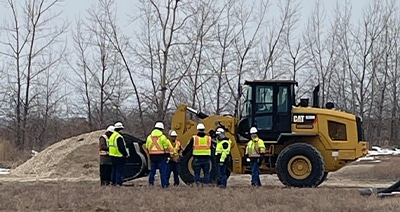Times Change – As Such, New Regulations and Industry Standards are Put Into Place
As companies evolve and grow, expansion tends to happen which sees employees take on new roles. These roles can include new responsibilities within the operator field, moving up in the company to take on a supervisory role, or one where training other employees may be the main part of their job description. With these new responsibilities comes important knowledge and information that may not have been necessary to know prior to being in these leadership positions.
Most operators that have been in the industry for long periods of time are extremely skilled with the tasks that go along with their day-to-day work, but not always are they up to speed with the most recent regulations and procedures that are being enforced and utilized in the industry.
At NIS training, one of the main components of the Train the Trainer program is the theory training that sheds light on some of the things that might not be common knowledge in the workplace, including policies that can be enforced by regulatory bodies. Regulations are based on accident statistics, so as the accident ratio increases, there tend to be more laws put into place for the safety of the employees.
There is a large benefit of the theory portion of the Train the Trainer program as there are many safety standards as well as policies and procedures that are brought up throughout the course. Sometimes, this part of the training can be the most shocking to trainees as there tends to be common misconceptions of what best practice is while operating the equipment. Interestingly, this tends to open the floor to great conversation with lots of dialogue discussing what the expectation is, comparing it to what current practices are. Post discussion, the trainees often end up changing the company policies so that they align closer to the expectations that are learned in the course.
One example of this pertains to modification of the equipment, especially when it comes to attachments that can be used with front end loaders, skid steer loaders, loader backhoes, and excavators.
The “old school” way of thinking in this instance is that it is perfectly fine practice to make alterations to an attachment such as a bucket or forks in order to be more efficient and get the job done quicker.
The “new school” way, under the proper safety regulations, dictates that all attachments must be approved for use by the manufacturer. The reason for this is that all attachments must have a decal clearly displaying its rated capacity so that it is much safer and unable to be overloaded. Written consent must be obtained from the manufacturer if any alterations or additions are to be made by a maintenance representative in the company.
It is important to go with the “new school” way of doing things in order to put yourself in the safest possible situation. Negligence or rushing could cause serious harm for yourself and others, and that is not something that any employer, or operator should want.
Being knowledgeable and up to date with the various rules and regulations that are put into place by the various governing bodies allows trainers to be sure that best practice is done every time.
At NIS Training we try to shift the thought process from doing things the easy way or the quick way, to doing things the safe and correct way, in a manner that is safe for everyone in the workplace and surrounding areas.
After completion of the Train the Trainer programs, we have noticed through feedback from our clients that we have taught them a different way of thinking, as well as informing them of the new rules and regulations they did not know were to be followed. Often, working with management of these companies, we can pinpoint different company policies that may be outdated so that they can be rewritten to be more up to date and compliant with the current laws.
Our trainers have been going through these programs and rewriting the manuals as new laws and regulations come out for over 20 years. There are different rules and regulations that are written for all types of equipment and are applicable for Aerial Boom Lifts, Excavators, Forklifts, Powered Pallet Trucks, Scissor Lifts, Backhoes, and Front-End Loaders. As such, there is quite a lot to learn, and we use multiple methods of teaching to make sure the importance comes across so that everyone can perform their tasks in the safest way possible, with the knowledge they need to do so.
To learn more about the NIS Train the Trainer Program, feel free to call us at 1-866-344-3950 or visit NIS Train the Trainer Programs for further information.

